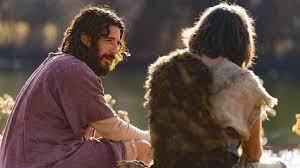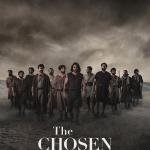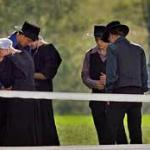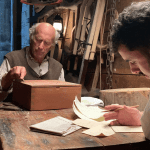Today is the Eighth Sunday after Pentecost; the gospel reading from Mark tells the story of John the Baptist’s imprisonment and execution, the final chapter in John’s story that was an important part of both Advent and Epiphany. Here is my entry for this Sunday in my book A Year of Faith and Philosophy that I am putting the final touches on:
In a second season episode of “The Chosen,” Jesus has a private conversation with his relative John the Baptist. Jesus and John not only are relatives and friends, but also have a strong sense of each other’s calling. John, appropriately scraggly as one would expect a guy who eats locusts and wild honey while wearing only animal skins to be, is impatient and impulsive, very anxious for Jesus to get on with his mission. Jesus, more thoughtful and deliberate, occasionally cautions John that he might, for his own health and safety, want to tone it down a bit.
But John isn’t having any of it. He’s on his way to the court of Herod Antipas to call the ruler out publicly for cohabiting with the former wife of his brother. Such a relationship is explicitly forbidden by the Torah. Jesus advises caution and clearly is not as outraged as John is by Herod’s antics. Suspecting that his relative is enjoying the prospect of a showdown with Herod a bit too much, Jesus suggests that they both have bigger fish to fry than what Herod and Herodias are up to. Speaking of his own mission, Jesus says that “I’m here for bigger purposes than the breaking of rules.”
John clearly takes pride in being direct with little regard for the consequences—“I always say the first thing that comes to my mind, in preaching and in life.” Accordingly, John is frustrated with what he perceives as Jesus’ reluctance to fully commit to the mission they both know Jesus was born to carry out. “I’m beginning to wonder why you are taking this so slow,” John complains, “why you are always running away after performing miracles.”
As the conversation continues, John apologizes for his rudeness and directness. “You know that my heart is yours. My life is yours. The sole reason that I was miraculously conceived by two old people was to pave the way for you. I’m just impatient for you to get to work.” As portrayed in “The Chosen,” this is a classic case of the natural tension between an extrovert and an introvert, between someone who always runs with the first thing that comes to mind and someone who deliberates carefully before speaking and acting. Jesus warns John “You know how this is going to end, don’t you?” to which John quickly responds “I get arrested all the time. It’s what radicals do.”
There is no record in the gospels of Jesus and John the Baptist ever meeting except at the River Jordan when Jesus was baptized. A conversation such as imagined in “The Chosen,” however, certainly could have taken place. They were relatives whose lives were inextricably intertwined from the time they were born just a few months apart. And Jesus is right—we do know how this is going to end. John is arrested for calling Herod Antipas out for his illicit relationship with his former sister-in-law. Herodias hates John for this and uses Herod’s lust for her daughter Salome to bring about John’s beheading.
On one end of John’s life is a miraculous birth narrative that rivals that of his younger cousin Jesus, and at the end of his life he finds himself in a dungeon and a state of despairing doubt. “Are you the one who is to come, or are we to wait for another?” These are the last words we hear from John the Baptist, the first recorded person to recognize adult Jesus for who he was. In The Good Book, a collection of essays in which thirty-two writers from all sorts of angles write about their favorite passages and characters from the Bible, Brooks Hansen focuses his essay on John’s poignant question from prison.
Doubt is the soil from which faith grows. Therefore, if John the Baptist is the first and most authoritative voice to recognize Jesus as savior—the first, in other words, to believe—then John must by that token have been the first to doubt.
There is a lesson in John’s story, a story that arced from miraculous birth to doubt while awaiting execution, for all those who believe in Jesus.
If we ever encounter any teaching, or feel ourselves succumbing to any creed or system of belief, that . . . does not struggle intimately and often—in the cistern of its soul—with the fear that it is mistaken, misdirected, falsely premised, or corrupt at its heart—we should take heed: That is not faith. That, in fact, is a fairy tale.
For reflection: According to Jesus, “among those born of women no one is greater than John.” Why do you think Jesus said this?
















